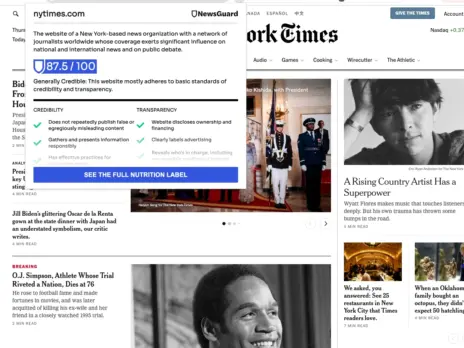
Measures intended to protect website operators from defamation actions over material which they did not create or post should be strengthened because they might otherwise have a "chilling effect" on freedom of expression, a joint committee of Peers and MPs said yesterday.
To make use of the defence, in Clause 5 of the defamation Bill currently going through Parliament, website operators would have to remove defamatory material following a notice of complaint if they had no means of contacting the author.
"We think that this could create a chilling effect, whereby statements which are in fact lawful, by virtue of an available defence, are removed from the public domain on the basis that a claimant has asserted they are defamatory," the Joint Parliamentary Committee on Human Rights warned.
"We recommend that the threshold be elevated to 'unlawful', a change which would also ensure consistency with the E-Commerce Directive and the Pre-action Protocol for defamation."
Clause 5, the committee said, "only requires a claimant to demonstrate why a statement is defamatory", adding: "The effect of the use 'defamatory' rather than 'unlawful' means that claimants would not have to consider if any defence were applicable.
"This could create a chilling effect, whereby statements which are in fact lawful by virtue of an available defence are removed from the public domain on the basis that a claimant has merely asserted they are defamatory.
"Unless website operators contest the validity of such notices, defamatory material which is nonetheless lawful will likely be suppressed.
"This places website operators in a precarious position whereby they can either comply and are protected, or challenge the validity of a mere assertion of defamation (rather than unlawful activity) and risk financial cost and associated strains of litigation."
The committee said it was "not satisfied" with the Government's attitude on this issue.
"We think there is a real risk that website operators will be forced to arbitrate on whether something is defamatory or lawful, and will to (sic) readily make decisions on commercial grounds to remove allegedly defamatory material rather than engage with the process," it said.
"As drafted, Clause 5 risks removing material from the internet, which, although it may be defamatory, may be lawful if a relevant defence applies. Material which is lawful may be suppressed because website operators are served with such notices."
The committee also said the Bill provided that regulations would set out a process for website operators to put complainants in contact with the author of allegedly defamatory material.
But as the regulations would effectively govern how website operators would be expected to respond to defamatory notices, their agreement required full Parliamentary debate, so they should instead be subject to the affirmative resolution procedure.
It also called for statutory guidance for universities and colleges, saying they were often website operators, and so would be able to use the Clause 5 defence only if they complied with a notice of complaint.
But they were also under a statutory duty under section 43 (2) of the Education (No. 2) Act 1986 to "take such steps as are reasonably practicable to ensure that freedom of speech within the law is secured for members, students and employees of the establishment and for visiting speakers".
The report said: "An institution publishing allegedly defamatory material may therefore be in a position of conflict – of attempting to adhere to the duty to protect freedom of speech in respect of allegedly defamatory material while also being under an obligation to remove it.
"We recommend that the Government should bring forward statutory guidance as to which duty should take precedence in that scenario, in order to assist educational institutions."
It also called for regulations made pursuant to Clause 5 to protect the anonymity of whistleblowers.
Data legislation needs 'fundamental rethink'
Meanwhile, Ministers today signalled that they will rewrite a Bill which gives police and security services new powers to monitor communications after an influential parliamentary committee branded the current proposals "overkill" and Deputy Prime Minister Nick Clegg said the planned legislation needed a "fundamental rethink".
Home Secretary Theresa May said she was determined to press ahead without delay with the Communications Bill, which critics have dubbed a "snooper's charter".
But she accepted the "substance" of a highly-critical report by the committee set up to scrutinise the draft version of the Bill, which would allow a range of official bodies to monitor e-mails, web phone calls and activity on social networking sites.
Cameron's official spokesman told a regular Westminster press briefing: "We understand that this is a controversial subject. That is why the Government took the decision to subject the Bill to pre-legislative scrutiny.
"The committee has come back with a series of issues and, as the Home Office has been making clear, we accept the substance of the committee's criticisms and we will look at how we can redraft the legislation to take account of those."
He added: "There is no difference of opinion on the principle here. We are all committed to fixing this problem that we have, which is that our capability is diminishing because of technology. We want to maintain that capability, we are not looking to extend it."
Under the draft Bill, details of e-mails, web phone calls and activity on social networking sites – but not their content – could be kept for a year, although there would be no real-time monitoring of communications.
Police, the security services, the new National Crime Agency and HM Revenue and Customs (HMRC) would be able to access the data, but the draft Bill also gives the Home Secretary the power to extend access to others, such as the UK Borders Agency.
The committee of MPs and peers said the legislation would give the Home Secretary "sweeping powers to issue secret notices" ordering communications companies to disclose "potentially limitless categories of data".
It accused the Government of using "fanciful and misleading" figures to support its case for the legislation.
Clegg said he was ready to block the Bill in its current form, and called on the Home Office to go "back to the drawing board".
"I believe the coalition Government needs to have a fundamental re-think about this legislation," said the Deputy Prime Minister.
"We cannot proceed with this Bill and we have to go back to the drawing board. We need to reflect properly on the criticisms that the committee have made, while also consulting much more widely with business and other interested groups."
Urging ministers to take the committee's concerns on board, Clegg said that the creation of any new powers must be done "in a proportionate way that gets the balance between security and liberty right".
Conservative security minister James Brokenshire today accepted that the legislation would have to be changed before being tabled in Parliament.
"We know that there is work that needs to be done and I absolutely accept that," he told the BBC Radio 4 Today programme.
"What we want to do is work through on these points, recognising that the Deputy Prime Minister has set out his concerns and making sure that the substance of the recommendations from the joint committee are addressed. We agree with that, that's what we will now be doing."
May used an article in The Sun to stress that legislation was needed to help security agencies keep pace with technological advances, which she said were being exploited by terrorists and paedophiles.
"You and your loved ones have the right to expect the Government to protect you from harm," she wrote.
"I will not allow these vitally important laws to be delayed any longer in this Parliament. This law is needed and it is needed now. And I am determined to see it through."
But she added: "Parliament has made suggestions about how our plans could be improved and we will accept the substance of its recommendations."
The committee set up to scrutinise the draft Bill dismissed ministers' argument that new powers for security agencies must be drawn broadly in order to "future-proof" the legislation against potential developments in technology.
Committee chairman Lord Blencathra said: "There is a fine but crucial line between allowing our law enforcement and security agencies access to the information they need to protect the country, and allowing our citizens to go about their daily business without a fear, however unjustified, that the state is monitoring their every move."
The committee found the Government was using "fanciful and misleading" figures to suggest that the reforms will deliver savings of three times its £1.8 billion costs over 10 years, and dismissed ministers' claims that a quarter of the communications data required by investigators was currently unavailable were "unhelpful and potentially misleading".
The report warned that plans to retain web logs carried a "possible risk" of being hacked or falling into the wrong hands, which would allow "potentially damaging inferences about people's interests or activities" to be drawn.
Lord Blencathra said: "The breadth of the draft Bill as it stands appears to be overkill and is much wider than the specific needs identified by the law enforcement agencies.
"We urge the Government to reconsider its zeal to future-proof legislation and concentrate on getting the immediate necessities right."
Meanwhile, a separate committee of MPs warned Prime Minister David Cameron that more work must be done on the draft Bill if the Government wants to win over Parliament and the public.
The Intelligence and Security Committee, which scrutinises the work of the security agencies, also criticised the 25% figure, warning that "superficially precise estimates" of the size of the capability gap were misleading and could detract from efforts to address the issue.
Email pged@pressgazette.co.uk to point out mistakes, provide story tips or send in a letter for publication on our "Letters Page" blog







